Horasis USA Meeting
Shaping America’s Role in the Post-COVID World
Horasis convened a digitally-mediated meeting focused on the USA with the focus on the country’s future, and its influence on the rest of the globe. The meeting gathered 750 speakers over more than 150 sessions. Many senior leaders from government and business – from the US and elsewhere – participated and proposed ideas on how to shape Americas and the world’s agenda. Download the meeting report and programme.
The meeting held a Special Plenary with 8 Ukrainian parliamentarians direct from Ukraine, noting for the first time in 77 years a European nation has been invaded. The world has condemned the action of Russia’s President Putin while Ukraine called upon the world to support its peoples in whatever way you can: democracy and decency demands this. Dmytro Kysylevsky, Chair of Economics Committee mentioned that nationalization of Russian property was underway and that many businesses were cutting ties with Russia. Ukraine is presently acting as a barrier between civilization and de-humanization and all of this aggression/ barbarism is really of global concern – well beyond only Ukraine. Olena Khomenko, Member of Parliament, Member of the Committee on Foreign Policy and Inter-Parliamentary Cooperation, Ukraine. Stated we would like all international businesses to support sanctions to follow the lead of the US. We might expect Russian inflation to top 30-40% , and national wealth to fall rapidly. She appealed to the Gulf, Asian and nations other than EU and US to step up action and condemn of Russia.
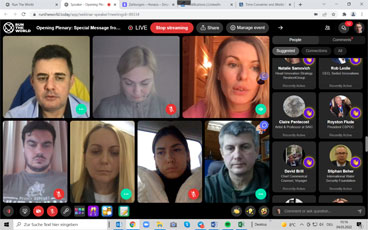 |
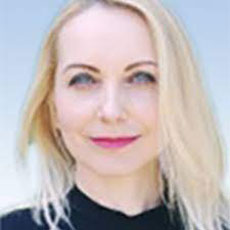 |
| Special Message from Ukraine – with Ukrainian Parliamentarians | Olena Khomenko, Members of Parliament, Member of the Committee on Foreign Policy and Inter-Parliamentary Cooperation, Ukraine |
A panel on Leadership in an Era of Humanitarian Crisis: The Role of Communities of Faith notes how the church and faith can aid Ukraine and others without discrimination. Although the pandemic and other events of global impact seem beyond control they ultimately affect people locally. People become disillusioned, and without hope fall prey to despair and populism. Religion can help us develop inspirational progress across economic, political and spiritual betterment, in the US and globally, as stated by Sharon Eubank, President, LDS Charities, USA said of her Church, “We have members in all the countries affected… they’re all receiving enormous numbers of refugees and are generously giving all the help that they can. And we have members in Ukraine who are facing impossible choices in the destruction of their beautiful country.”
An issue being discussed in the US is its next election and John Harris, Co-founder, Politico, USA guided the speakers to discuss if America will survive its next election. Brendan Boyle, Congressman for Pennsylvania, USA worries about US and other western nations who face electoral insurrections. We must not permit election officials to be replaced by partisans to overthrow correctly derived results. Analyses have show across the last US election there were few errors in the voting machines or in the processes of garnering the votes. Zach Conine, Nevada State Treasurer, USA concurs we need critical thinking – taught early in schools. So that policies could be discussed politically, not via character annihilation. There is a line to be drawn between factually correct vs ‘don’t like it’ opinions. He agrees too that ‘bad actors’ should not influence the election outcomes; nor allow state to state variation within federal laws/changes. Jim Himes, Congressman for Connecticut, USA was sked to consider hoe stances are changing. He says they are as experienced this when he was in the Chamber on 6th January when there was violence.
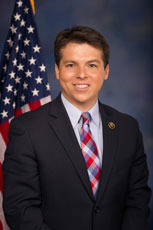 |
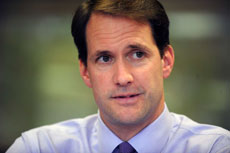 |
| Brendan Boyle, Congressman for Pennsylvania, USA | Jim Himes, Congressman for Connecticut, USA |
On a topic that might have developed many conversations there were few takers for the Presidential Review. Perhaps it was too large a subject and too fast changing. Raja Krishnamoorthi, Congressman for Illinois, USA suggested congressmen must work alongside business leaders to invest in US industries. Victoria Coleman, Chief Scientist, United States Air Force, USA said partnerships are vital to co-develop over many science sectors. They have to understand their reliance on supply chain needs and acknowledge the lack of some electronics.
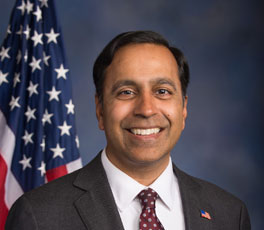 |
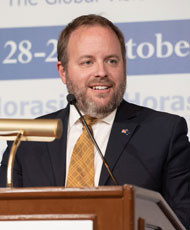 |
| Raja Krishnamoorthi, Congressman for Illinois, USA | Zach Conine, Nevada State Treasurer, USA |
COVID management, or rather applying the lessons learned to the next pandemic was often noted. Jon Cohen, Staff Writer, Science, USA was chair of this panel and noted from the outset that the discussants might have to be restrained from being scientifically obscure. The COVID virus was first noted in late 2019 in China and then spread rapidly across the world: with several variants emerging in late 2020, amongst them the highly virulent Omicron form. Globally there have been over 400 million cases, and nearly six million deaths. The original COVID and its variants seem to target different age groups and Peter Marks, Director, Center for Biologics Evaluation and Research, FDA, USA noted “Operation Warp-speed had a budget of $12m – from the start the scientists were confident of having a vaccine but this was not a certainty in a short time-frame”. Patrick Soon-Shiong, Executive Chairman, Nantworks, USA said “We must invent a generic COVID vaccine… this is still a difficult concept as there are so many variants of COVID structures.”
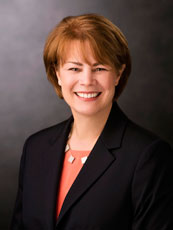 |
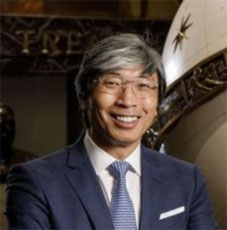 |
| Sharon Eubank, President, LDS Charities, USA | Patrick Soon-Shiong, Executive Chairman, Nantworks, USA |
COVID and supply chains were discussed in a panel on the US and the Global Economy, chaired by Gerard Baker, Editor at Large, Wall Street Journal, USA, saying “the Ukraine is a catastrophe with serious economic global implications, mostly yet unforeseen.” Andreas Fibig, Chairman and CEO, International Flavors & Fragrances (IFF), USA said “COVID and staffing issues have run down stock so there is no inventory building at present, and the labor shortage demands robotization but that in turn raises labor unrest.” Hank McKinnell, Former Chairman, Moody’s, USA coupled these thoughts with inflations “since Ukraine is the bread basket of Europe, and Russia is a massive fertilizer suppler.” He said the economy will not face the inflation well and though COVID raised many issues and we learned solutions, especially about labor “25% were more productive, 50% were doing the same & 25% could be removed.” Marco Antonio Del Prete, Minister of Sustainable Development, State of Queretaro, Mexico hopes “ the tragedy of Ukraine does not last long.” Jane Wurwand, Founder, Dermalogica, USA said immigration to the US must be addressed. Most immigrants are hard-working and many have skills.
Across many panels the effects of climate change were mentioned and specifically on this point Rania A. Al-Mashat, Minister of International Cooperation, Egypt noted the Ukraine invasion has eclipsed the presentation of the most recent IPCC Report on Climate Change. This is a long document noting how the globe is adapting, and counteracting climate change, and the general claim that projects in developing nations are too risky to uptake: there will be no profit, so are not a commercial risk. Mary Robinson, former President of Ireland and Chair of The Elders, Ireland asks that businesses work with the Multi-lateral Development Bank to de-risk investment. Thus, new projects become un-risked as the development bank can garner other investors and the project firm has a chance of becoming profitable. Tom Steyer, Founder of NextGen America, USA further stressed the importance of the clean energy and clean infrastructure, citing President Biden’s infrastructure plan. David de Rothschild, Founder, Voice for Nature, United Kingdom Agreed IPCC report is vital reading – as it may offer clues to avoid short-termism (politics) and support the long-term (business strategies). As illustrated by the Ukraine conflict – why are we not putting sanctions on big polluters? The inspiring panel was chaired by Sally Ann Ranney, Co-Founder, Global Choices, USA.
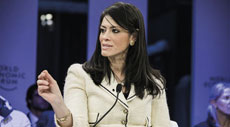 |
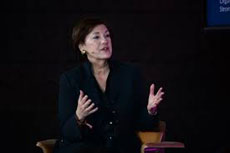 |
| Rania A. Al-Mashat, Minister of International Cooperation, Egypt | Zoë Baird, Chief Executive Officer and President, Markle Foundation, USA |
And then discussing America’s resolve in moving forward, chairperson Akiko Fujita, Anchor and Reporter, Yahoo Finance, USA asked her panelists what they thought was driving America. Zoë Baird, Chief Executive Officer and President, Markle Foundation, USA said “it became clear was how inter-dependent, we all were before, during and now post-COVID.” In the US they have found 77% do not have a college degree… the big question is “how to change this in a digital world to find how to express ‘uneducated’ persons’ innate skills?” This eases skill-based hiring. Deborah L. Wince-Smith, President and Chief Executive Officer, Council on Competitiveness, USA noted the US was in accord with Zoë Baird she noting “that US leadership depends on its strength domestically. And this is similar to the problems in Ukraine, and also China.” S. Ramadorai, Chairman, Tata Institute of Social Sciences, India said “during COVID the Global Alliance of vaccinations anti-covid was a great decision – later there will be circulating endemics and similar accords will be needed.” The innovation eco-system has global growth implications and have to be well thought-out – from energy supply to tech-developments. Presently the shortage of chips is creating an instant crisis and maybe creating poor knee-jerk decisions.
Co-chairs from the US:
| Zoë Baird, Chief Executive Officer and President, Markle Foundation, USA | |
| Steve Case, Chairman and Chief Executive Officer, Revolution, USA | |
| Lisa Edwards, President and Chief Operating Officer, Diligent Corporation, USA | |
| Augie K Fabela II, Chief Executive Officer and Co-Founder, FastForward.ai, USA | |
| Andreas Fibig, Chairman and Chief Executive Officer, International Flavors & Fragrances (IFF), USA | |
| Michael Froman, Vice Chairman, Mastercard, USA | |
| Hank McKinnell, Member of the Board, Moody’s, USA | |
| Barbara Prey, Artist and Member, National Council on the Arts, USA | |
| Michael Shvo, Chairman and Chief Executive Officer, SHVO, USA | |
| Patrick Soon-Shiong, Executive Chairman, Nantworks, USA | |
| Tom Steyer, Founder, NextGen America, USA | |
| Deborah L. Wince-Smith, President and Chief Executive Officer, Council on Competitiveness, USA | |
| Jane Wurwand, Founder, Dermalogica, USA |
Co-chairs from elsewhere:
| Bo Inge Andersson, Chief Executive Officer, Uzauto Motors, Uzbekistan | |
| Vijay Eswaran, Chairman, QI Group, Hong Kong | |
| Kris Gopalakrishnan, Chairman, Axilor Ventures, India | |
| S. Ramadorai, Chairman, Tata Institute of Social Sciences, India | |
| David de Rothschild, Founder, Voice for Nature, United Kingdom | |
| Murat Seitnepesov, Chairman, Caspian Week, Switzerland | |
| Vinod Sekhar, Chairman and Group Chief Executive Officer, Petra Group, Malaysia | |
| Marjorie Yang, Chairwomen, Esquel, Hong Kong | |
| Nadja Swarovski, President, German Fashion Council; Member of the Board, The Nature Conservancy, United Kingdom |
About Horasis: Horasis – a global visions community committed to inspiring our future – provides a unique platform for companies from emerging and developed markets to globalize their organisations. In addition to the Horasis Extraordinary Meeting, Horasis hosts the annual Horasis Global Meeting, Horasis India Meeting, Horasis China Meeting, Horasis Asia Meeting, as well as the annual gatherings of the Horasis Visionary Circle.
Achieving racial equity is important and US can lead, and incidentally make national near-neighbors safer – then with the economic stimuli that follows, healthier.
Barbara Lee, Congresswoman for California, USA
Biden is well-regarded – so bi-partisan discussions can begin as both parties re-learn to do their business jointly.
Raja Krishnamoorthi, Congressman for Illinois, USA
We must focus on the reform for the state electoral system.
Susan Bysiewicz, Lieutenant Governor, State of Connecticut, USA
I want to emphasize the US-linked role of Puerto Rico, being a US territory with US laws that ought to raise investors’ confidence.
Pedro Pierluisi, Governor of Puerto Rico, USA
The Infrastructure Bill will be revolutionary yet historic: permitting the US entrepreneurs to ‘Speed up America’ and be well positioned to help the world.
Richard Blumenthal, Senator from Connecticut, USA
The Infrastructure Bill will build trust with the US people and change the federal role dynamic in US.
Kate Brown, Governor of Oregon, USA
Building a domestic consensus in US will be more difficult than rebuilding with overseas nations.
Brendan Boyle, Congressman for Pennsylvania, USA
Suriname will develop new links - initially bi-laterally then multi-laterally.
Chan Santokhi, President of Suriname, Suriname
The future is not predicated only on step-changes but on the continued investment in education, becoming wiser ‘globally, and creating deep visions for the people.
Armen Sarkissian, President of Armenia
The US must look to its allies, or rebuild allies in regions recently ignored.
Indra Nooyi, Member of the Board, Amazon, USA
Mastercard was considering ‘inclusion’ well before COVID to bring the un-banked into FinTech so embrace the digital economy.
Michael Froman, Vice Chairman, Mastercard, USA
COVID-19 has been an amplifier of strengths and weaknesses.
Chad O. Holliday, Chairman, Shell, The Netherlands
In 2020 50% of entrepreneurial (teaching) programmes were taken by women so they should be able to command future investment.
Steve Case, Chairman and Chief Executive Officer, Revolution, USA
Relations with the US are very important. Much is being done to be more attractive for inward investment and to counteract drugs routes through Latin America.
Arnaldo Castillo, Minister of Economic Development, Honduras
The global COVID cooperation has shown good aspects of co-working as it is better to work together than have strong leverage on each other.
Jenny Gilruth, Minister for Europe and International Development Government of Scotland, UK
We must collaborate as alone is weak.
Rania A. Al-Mashat, Minister of International Cooperation, Egypt